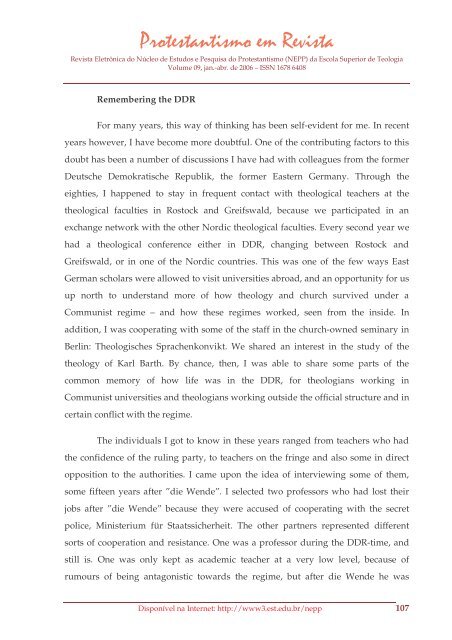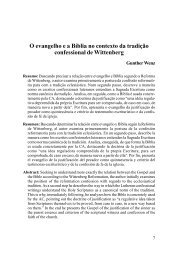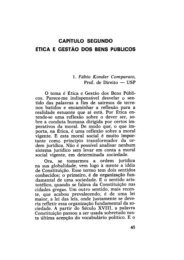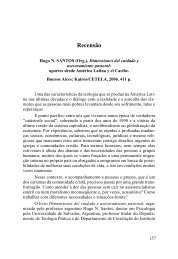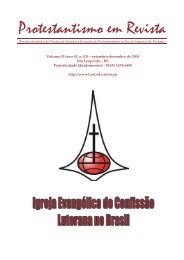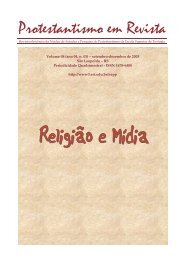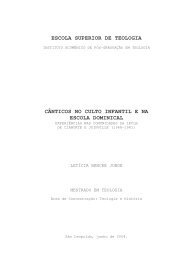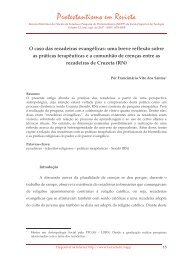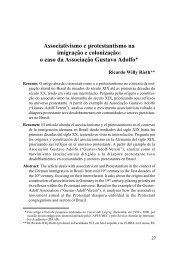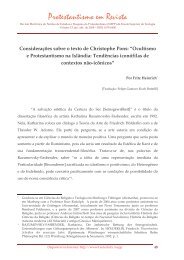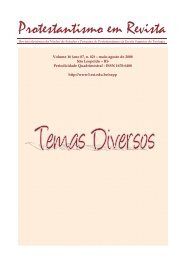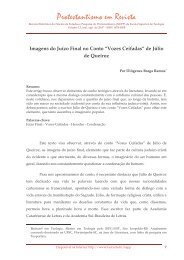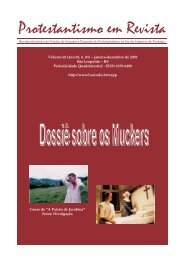Protestantismo em Revista, volume 09 (Ano 05, n.1) - Faculdades EST
Protestantismo em Revista, volume 09 (Ano 05, n.1) - Faculdades EST
Protestantismo em Revista, volume 09 (Ano 05, n.1) - Faculdades EST
Create successful ePaper yourself
Turn your PDF publications into a flip-book with our unique Google optimized e-Paper software.
<strong>Revista</strong> Eletrônica do Núcleo de Estudos e Pesquisa do <strong>Protestantismo</strong> (NEPP) da Escola Superior de TeologiaVolume <strong>09</strong>, jan.-abr. de 2006 – ISSN 1678 6408R<strong>em</strong><strong>em</strong>bering the DDRFor many years, this way of thinking has been self-evident for me. In recentyears however, I have become more doubtful. One of the contributing factors to thisdoubt has been a number of discussions I have had with colleagues from the formerDeutsche D<strong>em</strong>okratische Republik, the former Eastern Germany. Through theeighties, I happened to stay in frequent contact with theological teachers at thetheological faculties in Rostock and Greifswald, because we participated in anexchange network with the other Nordic theological faculties. Every second year wehad a theological conference either in DDR, changing between Rostock andGreifswald, or in one of the Nordic countries. This was one of the few ways EastGerman scholars were allowed to visit universities abroad, and an opportunity for usup north to understand more of how theology and church survived under aCommunist regime – and how these regimes worked, seen from the inside. Inaddition, I was cooperating with some of the staff in the church-owned s<strong>em</strong>inary inBerlin: Theologisches Sprachenkonvikt. We shared an interest in the study of thetheology of Karl Barth. By chance, then, I was able to share some parts of thecommon m<strong>em</strong>ory of how life was in the DDR, for theologians working inCommunist universities and theologians working outside the official structure and incertain conflict with the regime.The individuals I got to know in these years ranged from teachers who hadthe confidence of the ruling party, to teachers on the fringe and also some in directopposition to the authorities. I came upon the idea of interviewing some of th<strong>em</strong>,some fifteen years after ”die Wende”. I selected two professors who had lost theirjobs after ”die Wende” because they were accused of cooperating with the secretpolice, Ministerium für Staatssicherheit. The other partners represented differentsorts of cooperation and resistance. One was a professor during the DDR-time, andstill is. One was only kept as acad<strong>em</strong>ic teacher at a very low level, because ofrumours of being antagonistic towards the regime, but after die Wende he wasDisponível na Internet: http://www3.est.edu.br/nepp 107


